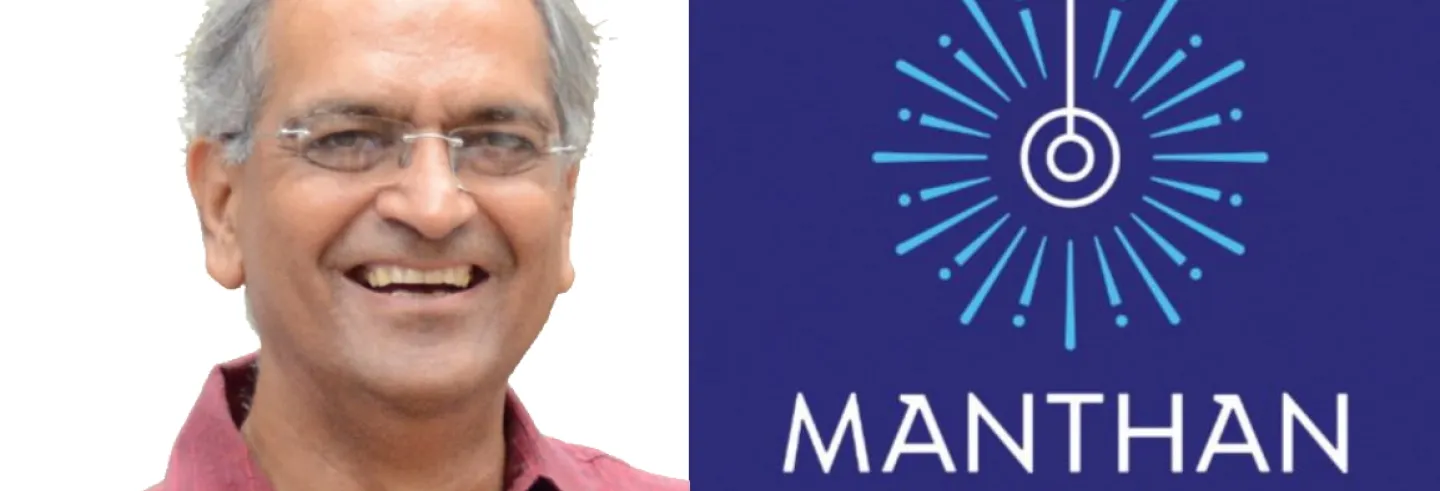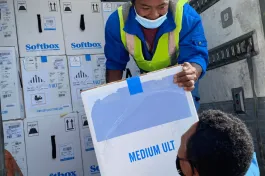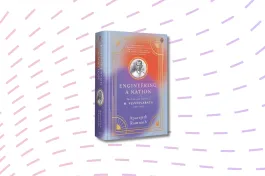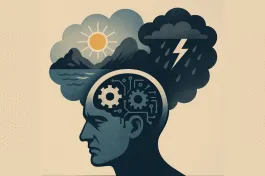In the age of fake news and abuse where the space for measured debates has all but disappeared, Manthan, the Hyderabad-based forum for public discourse and intelligent conversations as it describes itself, stands out for the quality of the 400 talks and discussions it has organised over the past 15+ years.
It has had speakers from across the country and the rest of the world speaking on a range of topics. To give an idea, the five most recent talks presented online over the past month have been: “Preserving Pakistani Music History”; “Ability in Disability”; “How Information Warfare Shapes the World”; “The State of Civil Services”; and “To Kill a Democracy: India’s Passage to Despotism”.
Manthan now has to cope though with the loss of one its founders, Ajay Gandhi, who died last week. Many have written (see this and this) about the multi-faceted personality that Ajay was: the co-founder of Manthan, trustee of the Hyderabad Literary Trust, a very successful Chartered Accountant who had his own firm, and a software entrepreneur (you can start from whichever end you would like, to describe his many skills and achievements). I unfortunately knew more only of the Manthan side of Ajay.
Some speakers at Manthan have been from Hyderabad, many visiting the city have been persuaded ... to make an appearance, and some have even flown in to give a talk.
Manthan has been the labour of love of Ajay and his friend of four decades, MR Vikram, two chartered accountants of Hyderabad, who in 1995 began organising discussion groups for their fellow professionals. A decade later this took the shape of this forum where academics, policy-makers, sportspersons, civil society activists, authors of new books, and literally anybody who can make an interesting argument was given a platform to speak to the public. Some speakers were from Hyderabad, some were visiting the city and were persuaded by the Ajay-Vikram network to make an appearance, and some even flew in to give a talk.
Until the pandemic, the events were usually held in the evenings under a large tamarind tree in the corner of Vidyaranya School of Hyderabad. This setting, the cosiness that speakers enjoyed with the audience and the manner in which Ajay and Vikram conducted the meetings brought public discussions to Hyderabad, a city that until then had nothing like this. The deep fried Hyderabadi samosas, the unique Osmania biscuits with tea (sickly sweet or without sugar, you could have your pick) that Ajay was always particular about were the hors d’oeuvre. The event that followed often saw differences of opinion but never the abuse that we now associate with public debates.
Ajay [Gandhi] saw the lockdown as an opportunity to spread Manthan to an audience beyond Hyderabad.
The audience was truly the ‘public’: students, young professionals, civil servants (retired and serving), political workers, civil society activists and just about any citizen who was curious about the issue being discussed. Every talk was followed by a lively question and answer session, which Ajay and Vikram moderated with care, with the young given as much of an opportunity as the well-established, and the zany query too given a hearing.
The pandemic ended the events under the tamarind tree, but Ajay saw the lockdown as an opportunity to spread Manthan to an audience beyond Hyderabad. They experimented with online talks, usually every Sunday morning, and succeed he did, with a band of volunteers who set up systems for the talks. During the course of the past 18 months when weariness with online events has grown worldwide, Manthan has been able to expand its viewership on Youtube, with live and repeat audiences running into thousands, and some into tens of thousands for each talk.
Ajay this year was on an overdrive looking out for new speakers, off-the-beat topics and the occasional book to discuss. He had, I think, a vision of making Manthan an even larger institution than it was. In the past six months, as he battled cancer, he expanded the Manthan Advisory Board, added new members to the discussion group he had created on Whatsapp, sought ideas to keep promoting old and new talks on social media, and much more. Manthan was so much of a passion for him (and he seemed to have many), that on occasion he even conducted a Manthan talk from his hospital bed, not always bothering to blur the background.
He was so disturbed about Pegasus that he wrote up a brief comment and spoke...arguing with concern, hurt and anger about the undermining of Indian democracy.
The passion that Ajay had about Manthan was not just about building the institution. It flowed from a desire to understand the world around him. The term ‘public intellectual’ is much bandied about; Ajay was a true public intellectual in that he was open, reflected about issues and closely engaged with the ‘public’ in discussions about India and its future. And here he was deeply, deeply concerned about what had happened to India in the past few years. The intolerance, hate, destruction of institutions, intimidation of critics, violation of the law, and degradation of democracy; all of this disturbed him immensely. This did not surface at a Manthan event, where he and Vikram confined themselves to introducing the speaker, the topic, posing the occasional question and leaving the floor to the audience.
Only once did Ajay himself speak at Manthan, on July 28 this year. That was when I realised how worried he was about where India was heading. It was a discussion around Pegasus, which he was insistent had to be discussed immediately at Manthan. Within a week of the Forbidden Stories revelations in The Wire, he had organised a talk/discussion by the journalist Seema Chisti and lawyer Prasanna S. He was so disturbed that he wrote up a brief comment and spoke for 10 minutes before the main event, arguing with concern, hurt and anger about the undermining of Indian democracy. Yet, pessimistic as he was about where India was heading, his senses did not get deadened. He remained ever open to a variety of ideas about how to make things better in India and in the world outisde.
One of Ajay’s last concerns about Manthan, on which he worked even in the final week of his life, while in hospital, was to make the Manthan Samvaad, the annual high-profile event always held around 2 October, a success this year as well, with the best speakers from India and outside. Sure enough, he had things in place and was already planning the regular Sunday for the next month and two. He has left behind a passionate band of “Manthanites”, the term he and Vikram gave to the regulars, who one can be sure will see to it that Manthan will not just continue, but grow as he had hoped it would.
Ajay was a true public intellectual in that he was open, reflected about issues and closely engaged with the ‘public’ in discussions about India and its future.
They say you make few close friends after you cross your 30s. My friendship with Ajay Gandhi developed only when I was in my 60s. And this was entirely on account of Ajay. Friendly, warm, open, curious, sensitive and ever willing to listen, advise and help, he instinctively drew you to him. He drew me into Manthan as a regular member of the audience, a sometime discussant, and then into helping him and Vikram conduct the events. But my relationship with him, as it did with many, went beyond Manthan.
A remarkable aspect of Ajay’s personaity was that he did not let a difference in views influence a relationship. He was a strong believer, actually a passionate believer, in free markets; I am not. But he did not judge me for my beliefs and, most extraordinarily, he put things across in such a way that he made you respect his point of view. This to me is something rare and showed how friendships need not be bound in a straitjacket of an identity of views. Something to learn from while living in our polarised society.
I am grateful in the few years of friendship with him to have also been the beneficiary of his large heart. When introducing me to friends or to a Manthan speaker, Ajay would never lose an opportunity to shower lavish praise on The India Forum as a place where some of India’s best writing now appeared.
In 2018, when some of us decided to launch The India Forum, one of the first persons with whom I discussed the form the publishing organisation should take was Ajay. He had immense experience, and, most importantly, I knew he would give time. Over the next couple of years, he guided us through the difficult process of getting registered as a public charity. His company worked through rejection after rejection. When he decided we should appeal to the Income Tax Tribunal; he took time off from his many activities to prepare our petition, personally appeared before the tribunal, argued our appeal and was able to convince it of our case.
I wonder where The India Forum would be now without his support.










